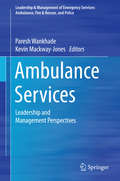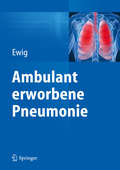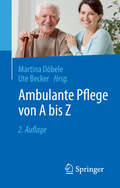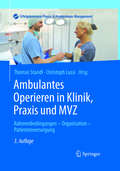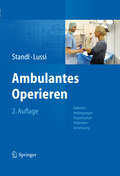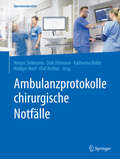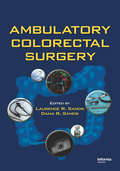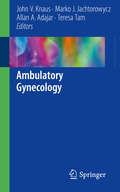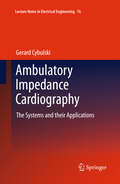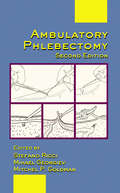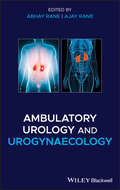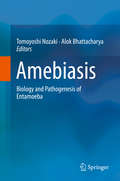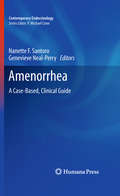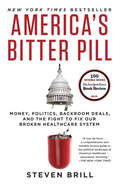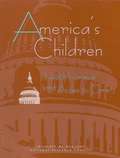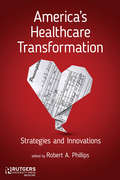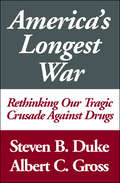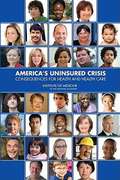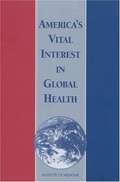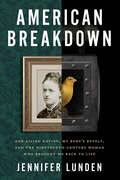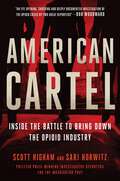- Table View
- List View
Ambulance Services: Leadership and Management Perspectives
by Kevin Mackway-Jones Paresh WankhadeThis volume provides fresh insights and management understanding of the changing role of the ambulance services against the backdrop of massive cuts in health budgets around the world and the changing context of pre-hospital care within the wider healthcare networks. The challenges of funding, training and cultural transformation are now felt globally. The need to learn and adapt from suitable models of ambulance service delivery have never been greater. The book offers critical insights into the theory and practice of strategic and operational management of ambulance services and the leadership needs for the service. One of the highlight of this volume is to bring together scholarship using experts- academics, practitioners and professionals in the field, to each of the chosen topics. The chapters are based in the practical experiences of the authors and are written in a way that is accessible and suitable for a range of audiences. We are confident that this book will cater to a wider audience to inform policy and practice, both in the UK and internationally. Paresh Wankhade is Professor of Leadership and Management at Edge Hill University, UK Kevin Mackway-Jones is the Medical Director at North West Ambulance Service NHS Trust, UK Endorsements "This unique and valuable publication, charts the history and development of the ambulance service in England over the last hundred years or so. The role of this key emergency service has always been important, and arguably never more so than today. The contributing authors have not only provided the reader with great insights into where the service has come from and the leadership challenges it has, and continues to face; it also gives examples of how the future could look as our journey of transformation continues. " Peter Bradley CBE, MBA (and author of Taking Healthcare to the Patient 2005), Chief Executive Officer. St John National Headquarters, New Zealand "With a year on year increase in demand for emergency ambulances and over 9 million calls annually, the UK Ambulance Service must change from its emergency care and transport focus model. With the increase in professionalism of paramedics and an uplift in assessment and clinical skills the modern paramedic is increasingly able to treat at home, direct patients with alternative care pathways and avoid transportation to overburdened Emergency Departments. Whilst there is some historical and cultural resistance to change there is a need for further development in clinical skills and a new perspective for the future Ambulance Service. This book brings together practitioners, managers, academics and provides a broad understanding of the major management issues in the UK Ambulance Service. It includes the history of the Ambulance Service, quality and risk management issues, commissioning, leadership, intra-operability and shape of the future ambulance service. The content will be of interest to students, practitioners and academics". Sir Keith Porter, Professor of Clinical Traumatology, University Hospitals Birmingham NHS Foundation Trust, United Kingdom
Ambulances
by Anne E. HansonDiscusses the parts and mechanics of amublances. Presents a brief history of early emergency medical care, the development of the ambulance, and ambulance rescue today.
Ambulant erworbene Pneumonie
by Santiago EwigDieses Buch bietet differenzierte Diagnostik und Therapie - was, wann, warum - zur sofortigen sicheren Anwendung. Entsprechend der neuesten Studien und Leitlinien aller wichtigen deutschen, europäischen und amerikanischen Fachgesellschaften. Es geht um eine der häufigsten akuten Erkrankungen in der Inneren Medizin in Deutschland mit erheblicher Hospital-Letalität von 4-10 % (höher als beim Myokardinfarkt). Oft wird die prognostische Bandbreite unterschätzt - auch Komplikationen und schwere Verläufe mit Multiorganversagen sind möglich. Grundlagen · Epidemiologie · Mikrobiologie und Immunologie (Differential-)Diagnostik, Prognose · Klinische Symptomatik und Untersuchungsbefunde · Radiologische Bildgebung · Labordiagnostik · Differentialdiagnostische Abgrenzung von Infektionen der unteren Atemwege (akute Bronchitis, akute Exazerbation der COPD) · Risikobeurteilung im Rahmen der Erstuntersuchung (Differential-)Therapie entsprechend Schweregrad Prävention, Nachsorge · Antimikrobiell · Adjunktiv · Bei Therapieversagen · Bei rezidivierender Pneumonie · Bei Aspirationspneumonie · In der Schwangerschaft · Als terminale Komplikation am Lebensende Strategie · Qualitätskontrolle der Behandlung · Arztbrief · Leitlinien Herausgeber Professor Dr. med. Santiago Ewig Chefarzt Thoraxzentrum Ruhrgebiet, Kliniken für Pneumologie und Infektiologie, EVK Herne und Augusta-Kranken-Anstalt Bochum.
Ambulante Pflege von A bis Z
by Martina Döbele Ute BeckerSicher und kompetent pflegen Dieses kompakte Praxisbuch unterstützt Pflegefachkräfte in der ambulanten Pflege mit prägnanten Beschreibungen zur Vorbereitung und Durchführung von Pflegemaßnahmen, dazu zahlreiche Praxistipps. Ideal zum Nachschlagen und Auffrischen für Anfänger, Wiedereinsteiger und Umschüler. Aus dem Inhalt Tägliche Pflegemaßnahmen wie Haut-, Intim-, Abendpflege Spezielle Maßnahmen wie Absaugen, Katheteranlage, PEG- und Stomaversorgung Unterstützende Maßnahmen, z. B. Wickel, therapeutische Waschungen Prophylaxen, u. a. Dekubitus und Dysphagie Wundmanagement Handlungsanweisungen für Notfälle, z. B. Schock, Atemnot Rechtliche Hinweise, u. a. zur Schweigepflicht, Vorsorgevollmacht und freiheitsentziehenden Maßnahmen
Ambulantes Operieren in Klinik, Praxis und MVZ: Rahmenbedingungen - Organisation - Patientenversorgung (Erfolgskonzepte Praxis- & Krankenhaus-Management)
by Christoph Lussi Thomas StandlIn diesem Buch beschreibt ein erfahrenes Herausgeber- und Autorenteam, wie die praktische Umsetzung des ambulanten Operierens in der Klinik, in einer Praxis oder in einem medizinischen Versorgungszentrum effektiv und ökonomisch gelingt. Das Werk wendet sich an Ärzte aller Fachdisziplinen, die in ambulanten OP-Einrichtungen arbeiten sowie an Klinikdirektoren, Verwaltungsdirektoren und Gesundheitsökonomen. Die 3. Auflage erscheint inhaltlich und strukturell komplett überarbeitet und trägt den neuesten Entwicklungen Rechnung. Der Schwerpunkt des Werkes liegt dabei auf den strukturellen und organisatorischen Aspekten des ambulanten Operierens, wobei auch für Anästhesisten und Operateure vieler Fachrichtungen medizinisch relevante Aspekte dargestellt werden.
Ambulantes Operieren: Rahmenbedingungen - Organisation - Patientenversorgung (Erfolgskonzepte Praxis- And Krankenhaus-management Ser.)
by Christoph Lussi Thomas StandlUm Kosten zu sparen, werden Operationen häufig ambulant durchgeführt. In dem Band erläutert ein erfahrenes Herausgeber- und Autoren-Team, wie ambulantes Operieren effektiv und ökonomisch umgesetzt werden kann. Mit dem Schwerpunkt auf strukturellen, organisatorischen, forensischen und ökonomischen Aspekten bietet der Band das notwendige Wissen, um ambulante OP-Einrichtungen aufzubauen und zu überprüfen. Mit Beispielen aus verschiedenen chirurgischen Fachgebieten. Die 2. Auflage wurde komplett überarbeitet und auf den neuesten Stand gebracht.
Ambulanzprotokolle chirurgische Notfälle (Operationsberichte)
by Olaf Richter Dirk Uhlmann Holger Siekmann Katharina Bolte Rüdiger NeefDas Verfassen eines formal und inhaltlich korrekten und rechtlich einwandfreien Berichts in einer Notfallambulanz ist in diesem Buch an über 150 beispielhaften Berichten aus der Unfallchirurgie und Orthopädie sowie der Allgemein-, Viszeral-, Gefäß- und Thoraxchirurgie anschaulich dargestellt. Sowohl Berichte zur stationären Aufnahme wie auch solche zur ambulanten Weiterbehandlung haben Platz gefunden. Einführende Kapitel erläutern den systematischen Berichtsaufbau und die rechtlichen Hintergründe sowie fachspezifische Besonderheiten. Zudem bieten die Berichte durch ihre Realitätsnähe vor allem dem Chirurgen in der Weiterbildung die Möglichkeit, sich auf seine Tätigkeit in der Ambulanz vorzubereiten.
Ambulatory Colorectal Surgery
by Laurence R. Sands Dana R. SandsA great single-source reference encompassing all aspects of colorectal surgery, Ambulatory Colorectal Surgery covers topics:patient evaluationanorectal anatomyanorectal ultrasoundbiofeedback techniquesfecal incontinence evaluation and managementwound managementstoma managementpain managementanal fissureanorectal abscessproctalgia fugax
Ambulatory Gynecology
by John V. Knaus Marko J. Jachtorowycz Allan A. Adajar Teresa TamFocus on evidence-based medicine sets this apart from the few other texts on the subject of ambulatory gynecology.<P><P> Applicable to all health professionals who treat patients with gynecologic disorders or symptoms.<P> Includes algorithms .<P> There are approximately 55,000 practicing ob/gyns in the United States. The obstetrics and gynecology residency training authority (the Accreditation Council for Graduate Medical Education) has now pushed ambulatory primary and preventative care to the top of its list for residency training. Interest in the area of ambulatory gynecology is not just growing in the field of ob/gyn, however; family and primary care practitioners, emergency room physicians, and advance practice nurses all must know how to diagnose, manage, and treat gynecological conditions. Since office technology has expanded and decision-making has become increasingly complex, physicians need a guide through the endless list of treatment options for commonly presenting gynecologic disorders. Ambulatory Gynecology gives practitioners tools for diagnosis, investigation and management of these disorders, including decision-making algorithms. The text is evidence-based. From endocrine disorders to breast disease, preventative measures for osteoporosis to management of an abnormal pap smear, from adolescent gynecology to menopause, this book is crucial for office-based physicians to feel confident practicing in all areas of gynecology.
Ambulatory Impedance Cardiography: The Systems and their Applications (Lecture Notes in Electrical Engineering #76)
by Gerard CybulskiThe book is divided in 4 parts. In the first one, the importance of the analysis of the cardiac dynamics using the ambulatory monitoring technique is presented. The second part contains the description of foundations of impedance cardiography (ICG), the models used to describe the ICG technique and the description of available systems for ambulatory monitoring of cardiac hemodynamics. The third part is devoted to the validation of the ambulatory ICG method, the verification of the quality of long term ICG recordings and the discussion of the limitations of this technique. In the last part, some clinical and research applications of the ICG ambulatory monitoring are presented. The simultaneous recordings of electrocardiogram (ECG) and ICG in the transient cardiac arrhythmia events illustrate the potential applications of that method for quantitative analysis of hemodynamics when the implementation of the stationary methods would be either difficult or not possible to do. The book is followed by references, alphabetical index and appendices containing the technical data of the available systems for portable monitoring of cardiac hemodynamics.
Ambulatory Phlebectomy (Basic and Clinical Dermatology)
by Mitchel P. Goldman Mihael Georgiev Stefano RicciThe only text specifically devoted to the subject, this Second Edition serves as a complete and practical guide for office-based surgical treatment of varicose veins-providing numerous illustrations showcasing the anatomy of varicose veins, as well as step-by-step coverage of the ambulatory phlebectomy technique.
Ambulatory Urology and Urogynaecology
by Abhay Rane Ajay RaneAccording to the International Association for Ambulatory Surgery (IAAS), ambulatory surgery should be defined as 'an operation/procedure, excluding an office or outpatient operation/procedure, where the patient is discharged on the same working day'. The rise of ambulatory surgery has been driven by technological advances that reduce the need for overnight hospital stays, enhanced recovery programmes that advocate early mobilisation, and the need for economic efficiency. Recent experience has shown that redistributing surgical procedures from the inpatient setting to ambulatory centres can be done without impacting quality. The majority of people requiring urologic surgery are now treated as day/outpatients – thus requiring a different level of care from inpatients. Ambulatory Urology and Urogynaecology is the only book that combines urology and urogynaecology focuses on outpatient management. Packed with learning points, practical hints and tips, and boasting an international group of contributing authors, this book is co-edited by world-leading pioneers in urologic and urogynaecological surgery. Ambulatory Urology and Urogynaecology is ideal for urologists, urogynaecologists and gynaecologists, as well as specialist urology nurses and surgeons. With more and outpatient procedures being performed, this book is the perfect step-by-step guide to consult time and time again.
Amebiasis: Biology and Pathogenesis of Entamoeba
by Tomoyoshi Nozaki Alok BhattacharyaThis book documents and presents new developments in the study of amebiasis, one of the neglected tropical diseases. Nearly 50 million people worldwide are infected with the pathogen Entamoeba histolytica, causing large-scale morbidity and mortality particularly in developing countries. This book will help clinicians for better diagnosis and management of the disease, researchers for initiating research projects on some of the poorly understood aspects of the disease and the pathogen, and students for updating their knowledge. The subjects covered range from genomics and molecular and cell biology to drug resistance and new drug development, highlighting major advances in recent years in our understanding due to rapid progress in genomic and other biomedical technologies, such as visualization of molecular processes. Most of the chapters provide recent information based on latest publications. A few chapters describe some of the critical methodological issues that will be helpful for students and researchers interested in getting into the field. The contributing authors include almost all the active researchers and clinicians from around the world. This book will be a useful primary material and a valuable source of information for anyone interested in understanding amebiasis, its diagnosis, and treatment. It will also be useful to those who are interested in learning about the biology of early branching eukaryotes and protist pathogens.
Amebiasis: Infection and Disease by Entamoeba Histolytica (Routledge Revivals)
by Roberto R. KretschmerFirst Published in 1990, this book offers a full, comprehensive guide to the process of amebiasis. Carefully compiled and filled with a vast repertoire of notes, diagrams, and references this book serves as a useful reference for students of medicine, and other practitioners in their respective fields.
Amenorrhea: A Case-Based, Clinical Guide (Contemporary Endocrinology)
by Genevieve Neal-Perry Nanette F. SantoroAmenorrhea: A Case-Based Clinical Guide is a comprehensive review of the current knowledge regarding normal female reproductive physiology. Replete with interesting case vignettes and providing diagnostic algorithms and therapeutic strategies for amenorrhea, Amenorrhea: A Case-Based Clinical Guide is divided into three sections. The first section is composed of two chapters that provide a thorough review of basic science and clinical knowledge about the organ systems responsible for normal physiology of the menstrual cycle. The second section includes discussion about menstrual cycle disruption as it relates to hypothalamic-pituitary dysfunction, surgical and natural menopause, genetic defects, premature ovarian failure/insufficiency and the effects of caloric excess and restriction. The third section offers an update on the physiological effects of prolonged amenorrhea induced surgically or by hypothalamic dysfunction and also includes an original chapter that focuses solely on the impact of race and ethnicity on the prevalence and diagnosis of amenorrhea. Amenorrhea: A Case-Based Clinical Guide brings together chapters from renowned experts who offer state-of-the-art, clinically useful information in a case-based, reader-friendly fashion. This title will be a welcome addition to the bookshelves of all clinicians who practice in women's health settings.
Amenorrhea: Volume 10: Frontiers in Gynecological Endocrinology (ISGE Series)
by Andrea R. Genazzani Angelica Lindén Hirschberg Alessandro D. Genazzani Rossella Nappi Svetlana VujovicThis volume comprehensively focuses on amenorrhea, one of the most important diseases in gynecology, affecting women from puberty to menopause.Amenorrhea is analyzed from its etiologies, pathogenesis, consequences and treatments throughout puberty, food and cycle disorders, exercise and stress impact, fertility- and sexual-related affection, and menopause transition.Written by experts in the field, this book will be of benefits to residents, general practitioners and specialists, gynecologists and endocrinologists, who deal with women’s health care.
America's Bitter Pill: Money, Politics, Backroom Deals, and the Fight to Fix Our Broken Healthcare System
by Steven BrillAmerica's Bitter Pill is Steven Brill's much-anticipated, sweeping narrative of how the Affordable Care Act, or Obamacare, was written, how it is being implemented, and, most important, how it is changing--and failing to change--the rampant abuses in the healthcare industry. Brill probed the depths of our nation's healthcare crisis in his trailblazing Time magazine Special Report, which won the 2014 National Magazine Award for Public Interest. Now he broadens his lens and delves deeper, pulling no punches and taking no prisoners. It's a fly-on-the-wall account of the fight, amid an onslaught of lobbying, to pass a 961-page law aimed at fixing America's largest, most dysfunctional industry--an industry larger than the entire economy of France. It's a penetrating chronicle of how the profiteering that Brill first identified in his Time cover story continues, despite Obamacare. And it is the first complete, inside account of how President Obama persevered to push through the law, but then failed to deal with the staff incompetence and turf wars that crippled its implementation. Brill questions all the participants in the drama, including the president, to find out what happened and why. He asks the head of the agency in charge of the Obamacare website how and why it crashed. And he tells the cliffhanger story of the tech wizards who swooped in to rebuild it. Brill gets drug lobbyists to open up on the deals they struck to protect their profits in return for supporting the law. And he buttresses all these accounts with meticulous research and access to internal memos, emails, notes, and journals written by the key players during all the pivotal moments. Brill is there with patients when they are denied cancer care at a hospital, or charged $77 for a box of gauze pads. Then he asks the multimillion-dollar executives who run the hospitals to explain why. He even confronts the chief executive of America's largest health insurance company and asks him to explain an incomprehensible Explanation of Benefits his company sent to Brill. And he's there as a group of young entrepreneurs gamble millions to use Obamacare to start a hip insurance company in New York's Silicon Alley. Vividly capturing what he calls the "milestone" achievement of Obamacare, Brill introduces us to patients whose bank accounts or lives have been saved by the new law--although, as he explains, that is only because Obamacare provides government subsidies for "tens of millions of new customers" to pay the same exorbitant prices that were the problem in the first place. All that is weaved together in an elegantly crafted, fast-paced narrative. But by chance America's Bitter Pill ends up being much more--because as Brill was completing this book, he had to undergo urgent open-heart surgery. Thus, this also becomes the story of how one patient who thinks he knows everything about healthcare "policy" rethinks it from a hospital gurney--and combines that insight with his brilliant reporting. The result: a surprising new vision of how we can fix American healthcare so that it stops draining the bank accounts of our families and our businesses, and the federal treasury.From the Hardcover edition.
America's Children: Health Insurance and Access to Care
by Committee on Children Health Insurance Access To CareAmerica's Children is a comprehensive, easy-to-read analysis of the relationship between health insurance and access to care. The book addresses three broad questions: How is children's health care currently financed? Does insurance equal access to care? How should the nation address the health needs of this vulnerable population?America's Children explores the changing role of Medicaid under managed care; state-initiated and private sector children's insurance programs; specific effects of insurance status on the care children receive; and the impact of chronic medical conditions and special health care needs. It also examines the status of "safety net" health providers, including community health centers, children's hospitals, school-based health centers, and others and reviews the changing patterns of coverage and tax policy options to increase coverage of private-sector, employer-based health insurance.In response to growing public concerns about uninsured children, last year Congress voted to provide $24 billion over five years for new state insurance initiatives. This volume will serve as a primer for concerned federal policymakers and regulators, state agency officials, health plan decisionmakers, health care providers, children's health advocates, and researchers.
America's Forgotten Pandemic
by Alfred W. CrosbyBetween August 1918 and March 1919 the Spanish influenza spread worldwide, claiming over 25 million lives, more people than those perished in the fighting of the First World War. It proved fatal to at least a half-million Americans. Yet, the Spanish flu pandemic is largely forgotten today. In this vivid narrative, Alfred W. Crosby recounts the course of the pandemic during the panic-stricken months of 1918 and 1919, measures its impact on American society, and probes the curious loss of national memory of this cataclysmic event. In a new edition, with a new preface discussing the recent outbreaks of diseases, including the Asian flu and the SARS epidemic, America's Forgotten Pandemic remains both prescient and relevant. Alfred W. Crosby is a Professor Emeritus in American Studies, History and Geography at the University of Texas at Austin, where he taught for over 20 years. His previous books include Throwing Fire (Cambrige, 2002), the Measure of Reality (Cambridge, 1997) and Ecological Imperialism (cambridge, 1986). Ecological Imperialism was the winner of the 1986 Phi Beta Kappa book prize. The Measure of Reality was chosen by the Los Angeles Times as one of the 100 most important books of 1997.
America's Healthcare Transformation: Strategies and Innovations
by Thomas H. Lee Sandra A. Weiss Nikhil G. Thaker Arthur Tim" Garson David W. Bates Hanh H. Hoang Philip Greenland Tine Hansen-Turton Sarah Slight James L. Field Susan A. Abookire Thomas W. Feeley Amir Rubin Janet J. Teske Julia D. Andrieni Alicia D.H. Monroe Kenneth Patric Steven R. Steinhubl Elizabeth Malcolm Nana Ekua Coleman Mark R. Chassin William S. Weintraub Kasey R. Boehmer Arnold Milstein Sharyl Wojciechowski Marc L. Boom Victor M. Montori Henry H. Ting Ju Young Kim Erin S. Dupree Gary S. Kaplan Mauro Ferrari Jason Gorevic Kasaiah Makam Kunal N. Karmali Alberta T. Pedroja Dr Robert A. Phillips Deirde MylodA revolution in American medicine is in full swing, with the race from fee-for-service to fee-for-value at the front line in an epic battle that will transform healthcare delivery for decades to come. In America's Healthcare Transformation, eminent physician leader Robert A. Phillips brings together key thought leaders and trail-blazing practitioners, who provide a wide-ranging exploration of the strategies, innovations, and paradigm shifts that are driving this healthcare transformation. The contributors offer a panoramic look at the dramatic changes happening in the field of medicine, changes that put the patient at the heart of the process. Among other subjects, the essays evaluate innovative high quality and low cost care delivery solutions from around the United States and abroad, describe fundamental approaches to measuring the safety of care and the impact that guidelines have on improving quality of care and outcomes, and make a strong case that insurance reform will fundamentally and irreversibly drive delivery reform. In addition, America's Healthcare Transformation reviews the role of health information technology in creating safer healthcare, provides a primer on the development of a culture of safety, and highlights ground-breaking new ways to train providers in patient safety and quality. Finally, the book looks at reports from Stanford Health Care and Houston Methodist which outline how successful behaviorally based strategies, anchored in values, can energize and empower employees to deliver a superior patient experience. Drawing on the wisdom and vision of today's leading healthcare innovators, America's Healthcare Transformation provides a roadmap to the future of American healthcare. This book is essential reading for all health care providers, health care administrators, and health policy professionals, and it will be an invaluable resource in the effort to improve the practice of medicine and the delivery of healthcare in our communities and nation.
America's Longest War: Rethinking Our Tragic Crusade Against Drugs
by Steven B. Duke Albert C. GrossAmerica's war on drugs. It makes headlines, tops political agendas and provokes powerful emotions. But is it really worth it? That&’s the question posed by Steven Duke and Albert Gross in this groundbreaking book. They argue that America&’s biggest victories in the war on drugs are the erosion of our constitutional rights, the waste of billions of dollars and an overwhelmed court system. After careful research and thought, they make a strong case for the legalization of drugs. It&’s a radical idea, but has its time come?
America's Uninsured Crisis: Consequences for Health and Health Care
by Institute of MedicineWhen policy makers and researchers consider potential solutions to the crisis of uninsurance in the United States, the question of whether health insurance matters to health is often an issue. This question is far more than an academic concern. It is crucial that U.S. health care policy be informed with current and valid evidence on the consequences of uninsurance for health care and health outcomes, especially for the 45.7 million individuals without health insurance. From 2001 to 2004, the Institute of Medicine (IOM) issued six reports, which concluded that being uninsured was hazardous to people's health and recommended that the nation move quickly to implement a strategy to achieve health insurance coverage for all. The goal of this book is to inform the health reform policy debate--in 2009--with an up-to-date assessment of the research evidence. This report addresses three key questions: What are the dynamics driving downward trends in health insurance coverage? Is being uninsured harmful to the health of children and adults?Are insured people affected by high rates of uninsurance in their communities?
America's Vital Interest In Global Health: Protecting Our People, Enhancing Our Economy, and Advancing Our International Interests
by Board on International HealthInformation on America's Vital Interest In Global Health
American Breakdown: Our Ailing Nation, My Body's Revolt, and the Nineteenth-Century Woman Who Brought Me Back to Life
by Jennifer LundenA Silent Spring for the human body, this wide-ranging, genre-crossing literary mystery interweaves the author’s quest to understand the source of her own condition with her telling of the story of the chronically ill 19th-century diarist Alice James—ultimately uncovering the many hidden health hazards of life in America.When Jennifer Lunden became chronically ill after moving from Canada to Maine, her case was a medical mystery. Just 21, unable to hold a book or stand for a shower, she lost her job and consigned herself to her bed. The doctor she went to for help told her she was “just depressed.”After suffering from this enigmatic illness for five years, she discovered an unlikely source of hope and healing: a biography of Alice James, the bright, witty, and often bedridden sibling of brothers Henry James, the novelist, and William James, the father of psychology. Alice suffered from a life-shattering illness known as neurasthenia, now often dismissed as a “fashionable illness.”In this meticulously researched and illuminating debut, Lunden interweaves her own experience with Alice’s, exploring the history of medicine and the effects of the industrial revolution and late-stage capitalism to tell a riveting story of how we are a nation struggling—and failing—to be healthy.Although science—and the politics behind its funding—has in many ways let Lunden and millions like her down, in the end science offers a revelation that will change how readers think about the ecosystems of their bodies, their communities, the country, and the planet.
American Cartel: Inside the Battle to Bring Down the Opioid Industry
by Sari Horwitz Scott HighamThe definitive investigation and exposé of how some of the nation's largest corporations created and fueled the opioid crisis—from the Pulitzer Prize-winning Washington Post reporters who first uncovered the dimensions of the deluge of pain pills that ravaged the country and the complicity of a near-omnipotent drug cartel. AMERICAN CARTEL is an unflinching and deeply documented dive into the culpability of the drug companies behind the staggering death toll of the opioid epidemic. It follows a small band of DEA agents led by Joseph Rannazzisi, a tough-talking New Yorker who had spent a storied thirty years bringing down bad guys; along with a band of lawyers, including West Virginia native Paul Farrell Jr., who fought to hold the drug industry to account in the face of the worst man-made drug epidemic in American history. It is the story of underdogs prevailing over corporate greed and political cowardice, persevering in the face of predicted failure, and how they found some semblance of justice for the families of the dead during the most complex civil litigation ever seen.The investigators and lawyers discovered hundreds of thousands of confidential corporate emails and memos during courtroom combat with legions of white-shoe law firms defending the opioid industry. One breathtaking disclosure after another—from emails that mocked addicts to invoices chronicling the rise of pill mills—showed the indifference of big business to the epidemic&’s toll. The narrative approach echoes such work as A Civil Action and The Insider, moving dramatically between corporate boardrooms, courthouses, lobbying firms, DEA field offices, and Capitol Hill while capturing the human toll of the epidemic on America&’s streets.AMERICAN CARTEL is the story of those who were on the front lines of the fight to stop the human carnage. Along the way, they suffer a string of defeats, some of their careers destroyed by the very same government officials who swore to uphold the law before they begin to prevail over some of the most powerful corporate and political influences in the nation.
